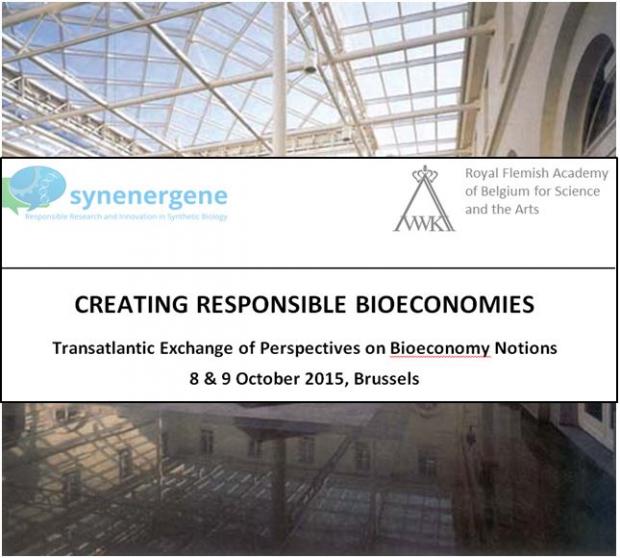
Workshop summary report: CREATING RESPONSIBLE BIOECONOMIES
Submitted by harald_kit on
The concept of a bioeconomy is a prominent notion on both sides of the Atlantic. Bioeconomy strategies and policies have been outlined in national and transnational strategy papers, often promising major socioeconomic contributions to improving health outcomes, increasing the productivity of agriculture and industrial processes, and boosting environmental sustainability.
Against this backdrop the workshop saw 27 European and U.S. experts from the fields of policymaking, industry and civil society organisations (CSOs) discussing different stakeholder perspectives on bioeconomic notions, expectations and future challenges. The workshop results, briefly summarized here, will contribute to the SYNENERGENE project’s agenda-setting process that aims to involve policymakers, industry, researchers and societal actors in the responsible introduction and use of synthetic biology and advanced biotechnology.
On the first day (October 8) the bioeconomy notions and the state-of-play of the EU and U.S. bioeconomy strategies as well as the perspectives of experts from economics, technology assessment (TA), science and technology studies (STS), industry, and of private investors and CSOs were presented and explored to identify key issues connected to bioeconomy strategies and their implementation, with a special view to potential issues arising from emerging/advanced biotechnologies (such as synthetic biology). Starting with these results, European and American policy experts draw their perspective on identified key issues on the second day (October 9), followed by a discussion session. A final roundtable discussion strived to jointly explore what “responsible” could mean, what mutual expectations are, and how potential actions and conditions for the development towards responsible bioeconomies should/could look like.
In discussing different bioeconomy notions and the state-of-play of bioeconomy strategies on both sides of the Atlantic, the following key issues connected to bioeconomy strategies and their implementation were identified:
(i) What are the mechanisms for holding public and corporate R&D to sustainability concerns - similar to Horizon 2020 research?
(ii) What are the assessments of policy outcomes, positive and negative? How to keep a responsible bioeconomy honest – fact-checking claims about environmental benefits?
(iii) How to take account of the global impacts of national strategies, especially with regard to biomass and/or feedstock provision of the global South?
(iv) Public involvement is viewed as very important – how can it be implemented without slowing down the pace of innovation (e.g. by extending times for regulatory approval)?
(v) Where are new regulatory challenges from the bioeconomy that have not been yet met, e.g. CRISPR/CAS genome editing technology?
(vi) In light of negative attitudes towards the bioeconomy and the commodification of nature, how can one create a positive environment for investors, DIY/maker community?
The pivotal points of discussion linked to all the identified key issues were the sustainability of the bioeconomy and the global nature of the bioeconomy, with sustainability and socio-economic issues especially in the global South. With a view to the role of new or advanced biotechnologies/ synthetic biology a sharp divide in opinions emerged. On the one hand it was argued, mainly by representatives from industry and policy, that these new technologies will be required for more efficient biomass use and thus less land use. On the other hand, mainly CSO representatives suggested that they will accelerate and increase biomass use and enhance negative impacts (such as land-use change, deforestation and associated GHG emissions, or destroying livelihoods of indigenous people) – while neglecting other more sustainable solutions. A common point of private investors, some industry representatives and CSOs was the critique of ill-designed subsidies for bioenergy/biofuels. In keeping with the ‘cross-cutting’ nature of the (global) sustainability issue, sustainability – as a broad endeavour to manage and balance environmental and social factors as well as economic development (also in countries of the global South) – was widely seen as a ‘key meaning’ of responsibility related to the bioeconomy.
As a prerequisite for such an endeavour, “responsible” with respect to the bioeconomy would also have to mean being responsive to societal needs, demands or values. Since needs and values may differ between stakeholders, (co-)responsiveness to different needs and values would require inclusive processes – including all stakeholders and potentially impacted people – and, at some point, would have to result in mutual obligations.
Thus, in order to collaborate or ”co-create”, a common view was that it is essential to bring different notions and views together. This would require platforms for (continuous) engagement of stakeholders and the public (such as stakeholder meetings/panels that should also involve affected local communities, or public events) — in order to foster exchange and debate as well as for consultation as part of regulatory processes. Furthermore, moving conversations from meeting rooms to “real-world experience” by enabling citizen science (such as DIY biology) has been proposed. Importantly for such inclusive processes, “responsible” was also broadly seen to mean being honest and clear/transparent about promises and challenges. This would also include to become aware of limits and acknowledge limitations, including limits of assessment
